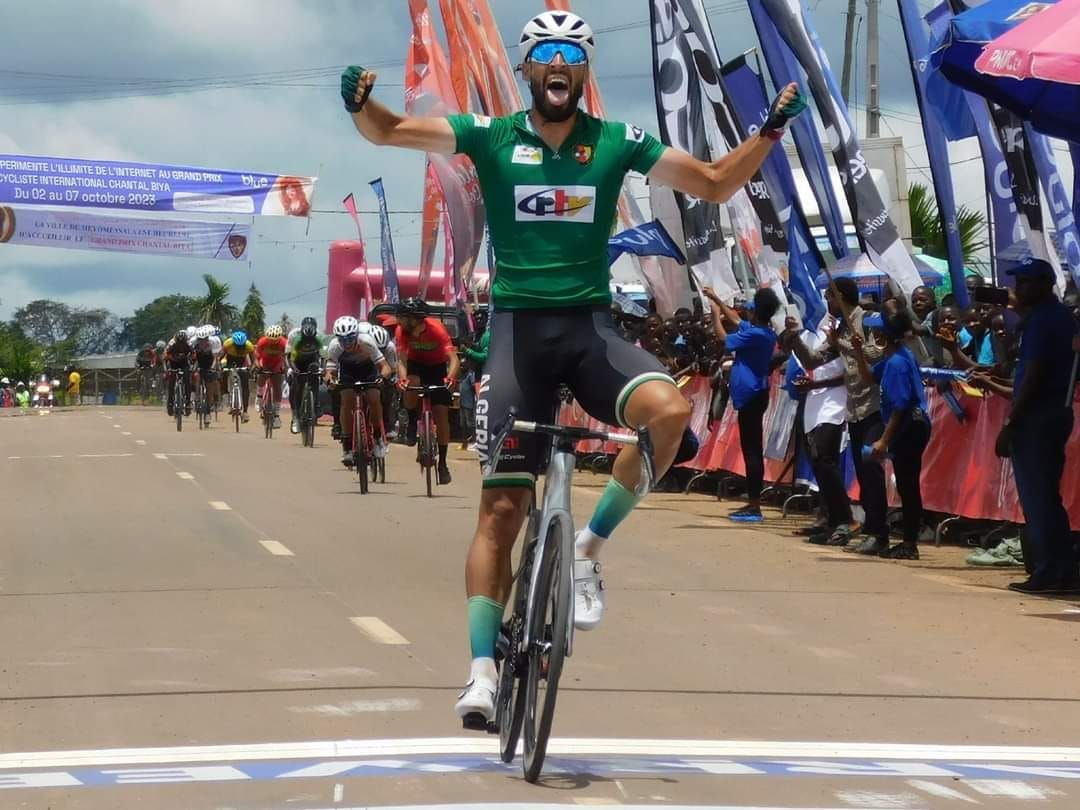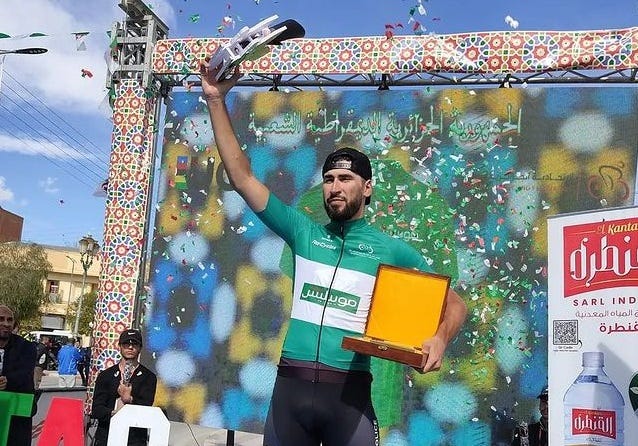Yacine Hamza: 17 UCI wins and no pro contract
In an interview with Global Peloton, Hamza reveals his team for 2024, what it means to finish third in the world and how he achieved so many wins in one year
How can a rider sit third on the UCI win rankings for the season and not claim a pro contract for the following year?
It’s one of the many perplexing contradictions that pro cycling throws up. In sport, the cream should rise to the top. If you win, score points or in some other way show enough ability, you should progress in the sport. But that’s not the case. Other factors come into play.
One major factor is a rider’s nationality. Many teams have national identities, with a majority of their riders coming from the nation of the team’s sponsor. A rider’s nationality can also impact visa processes, cultural differences and the perception of their results.
It’s this phenomenon that has meant that one of the most successful cyclists of 2023, Algeria’s Yacine Hamza, will not ride for a professional team in 2024. This is despite winning 17 UCI races over the season.
In a world where UCI points are ever more important, it’s somewhat baffling.
Contract Search
Hamza was approached by three teams outside of Africa for the 2024 season; Nice Metropole, an unnamed continental team in China and UAE Team Emirates’ brand new development squad.
Things looked most promising with the French team, especially as Hamza is a French-speaker like many Algerians. The team were impressed by Hamza when racing against him at the Tour de Algerie, where he won four stages. Unfortunately, as Hamza told Global Peloton, the communication went cold.
“At the Tour of Algeria they told me about the project, and they will contact me again when they finalise their budget, but since then there was nothing. Even if I tried to contact them, there was nothing from them,” Hamza said.
Hamza will race for a brand new Algerian continental team called Team Madar in 2024. It’s the first time since 2020 that Algeria have had a UCI team and they aim to develop the swell of young Algerian talent which is coming through by racing in Europe and Asia.
“They have big ambitions for next year,” Hamza said. “It's really interesting to race with them and with my home team. We are looking forward to this team for next year and I think we will have a lot of races in Europe also.”
“They’re ambitious, they are looking for invitations, especially in Europe. For now, they can race in Turkey and some Asian races, especially in China, and maybe all the African calendar.”
If all comes to pass, Hamza will ride a slightly elevated calendar in 2024, compared to his year on the Africa scene with the national team this season. The hope is that Hamza can continue his winning streak overseas and secure that elusive professional contract.
It’s in the family
A symptom of its past as a French colony, Algeria has a long history in cycling. The first Algerian-born riders raced the Tour de France more than 100 years ago. There have been resurgences since, particularly in the 1950s, but that was before Algeria gained independence from France in 1962. No Algerian-national has ever ridden the Tour de France post-independence.
Cycling culture has remained strong in the North African nation ever since and Hamza’s father and uncle were famous cyclists in Algeria. This gave Hamza an early start in the sport.
“I started cycling when I was five. Three years later I started my first races. I'm from a big family of cycling in Algeria.”
Hamza continued to race throughout his adolescence and competed in Europe and at the World Championships as an under-23 with some success. However, he tells me that it’s only recently that he began to take the sport more seriously, with sensational results.
“I really started to train seriously this season and last season. It's really this season I felt the difference. I started to win a lot of races in Africa.”
“This season I started a new method of training. I had a nutritionist, so I changed my my nutrition and I had a good coach. I'm happy to see the the difference in my wins.”
Dominating the Africa Tour
The Algerians have become a successful force on the African racing schedule. They take solid results in almost every African UCI race that they turn up to.
This year, Hamza won three stages at the Tour du Bénin, three more at the Tour du Cameroun, four at the Tour de Algerie and two as well as the the overall at the season-ending GP Chantal Biya. He added to these with other successes in the Middle East.
African racing suits a pure sprinter like Hamza. It’s often very flat and sometimes windy. The truth is that Hamza and several other north Africans are a level above at many races.
“In Africa, it's more easy for me to win races. For sure I’m a sprinter, but in Africa I can do other things than sprinting, like finishes uphill, not longer climbs, but small climbs, and I can break away.”
Hamza recalled one of his wins where he surprised himself with how he was able to beat his opponents uphill.
“My last win in Cameroun came in the fourth stage. I was afraid of the uphill finish. When I arrived, I just made my sprint and I got two seconds on the peloton. It was a very very strong sprint for me.”

Dispersed between his African wins have been several opportunities to race in Europe in 2023, including placing a close second behind Astana Qazaqstan’s Martin Laas on a stage of the Tour of Sakarya and a place in the World Championships road race in Glasgow - where he suffered alongside many others after the race was restarted post-protest.
Although the level of African racing is growing, Hamza has felt the chasm between it and racing in Europe.
“The difference between racing in Africa and Europe is it's a big bunch with a high pace. In Africa, we can do the race, we can break away and do some efforts. But in Europe, when you are a sprinter we just have to wait for sprints. We can't do some other efforts or we won’t be able to sprint with the best sprinters.”
“It's a very high level and many riders want reach the front, so you have to fight for your position.”
More motivated than ever
Going into the 2024 season, with his new team and a better programme of racing, Hamza is determined to prove that he is worthy of a professional contract.
He finished third on the win rankings for 2023, only behind Miguel Angel Lopez and Jasper Philipsen. Now, he wants more.
“It's a it's a big honour for me to see my name with such big names. Yes, it's not the same races but it's still UCI races. So for me it's a big motivation to work more to try to reach another level. And why not to try and have my chance to race with the professionals?”
What more does a rider on the Africa Tour have to do to ascend the sport of cycling? It’s not clear that there is any more on can do. Hamza will hope that results in higher-level races in 2024 will unlock the door to the professional ranks.
You can listen to part of this interview on Radio Cycling
Thanks for reading Global Peloton!
If you enjoyed this post, please consider subscribing and sharing.
You can also add a paid subscription if you want to support Global Peloton and enable me to bring you more international cycling news and stories.





What kind of structure is there for riders who don't have access to agents and professional representatives? Do they just have to represent themselves?